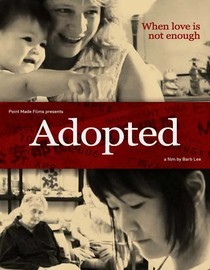
This film shows the vast difference between the old way of interracial adoption [colorblind] and the new way [embracing the culture]. The documentary follows the story of a 32 year old woman adopted from Korea into a Caucasian family, as well as a 30something couple adopting a baby named Roma, from China.
The Korean-American woman (Jen) is talking about her issues with feeling like she had to hide her ethnicity. She tries to talk to her parents about her biological ties and culture and they continue to ignore it stating that they are doing the best that they can and that they were raised to not see color. Jen is suffering from many issues and it comes out in many destructive ways in her life. The bottom line is that she had struggled with identity and self loathing because she was made to feel that she was white and that she fit in and wasn't different. She struggled with the grieving of her birth family because her new family was only interested in celebrating the adoption. Jen, fortunately was blessed with a brother who understands how she feels and supports her in trying to talk to her parents. Unfortunately, Jen comes from a generation where it was thought best to talk little of the adoption or biological culture for fear of offending or making her feel different. The problem is that when Jen looks in the mirror she sees that she is different, but being made to feel that different was taboo had made her feel shame.
On the other hand Roma's parents are embracing her culture. They are taking classes on attachment and race issues and seem to be wanting to combine not only Roma's culture but all of their family's cultures into their family. Roma's parents brought me to tears many times because not only are they going through a similar process as us, but they have had heartbreak from failed pregnancies that have brought them to a greater place of desperation. So in their story there is loss on both ends, and though that may make it harder to get through the barriers they will also have a greater understanding of the loss each is going through. At the same time, many of the things that Roma's mother said are things that I have thought and felt. I related much to her, though we are in very different situations, because the current process (which embraces multiculturalism) is something we are both experiencing.
So, being colorblind clearly has problems. I also think that being set apart as different to an extreme can have its problems. But I believe there is a healthy balance, similar to Roma's situation, where you honor the cultures, acknowledge and comfort the loss, talk about things as a family, but also acknowledge other differences in the family. For instance, the difference in the backgrounds of Bryan and I, or the different shades of our skin or our eyes. The beautiful differences in our family is what will make us interesting to each other. We can love and appreciate them but I think once we make it clear to our child that we can talk about any of these things, and teach them what a beautiful culture they have, then we will be able to adjust based on our child's personality.
I definitely recommend this movie to anyone adopting. Even if its what you have heard before it is good to see personal stories reflecting what we have read in books.
No comments:
Post a Comment